Herbal Tea Benefit
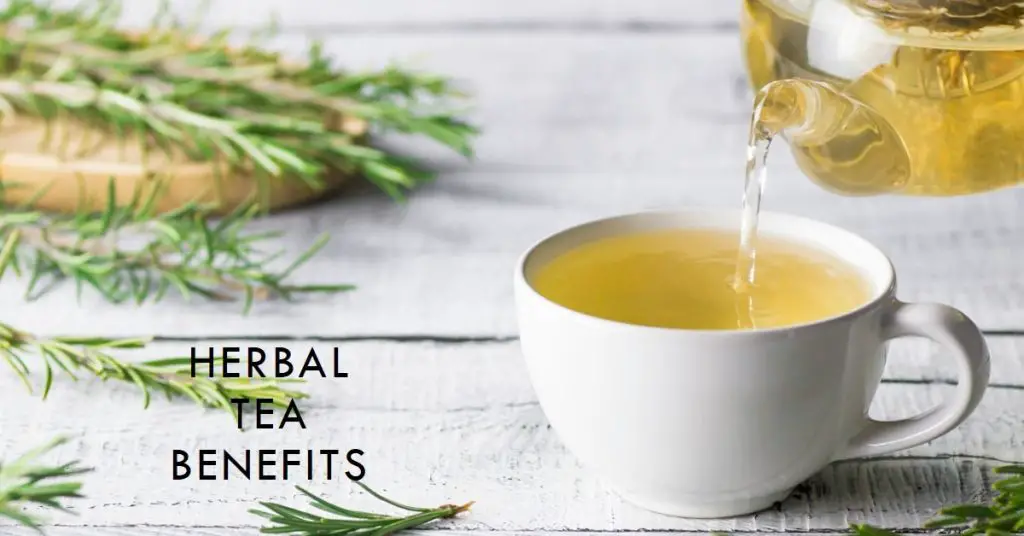
Herbal tea has been a part of my life for as long as I can remember, and I can truly say it has had a positive impact on my health. From keeping me healthy to boosting my immune system, the benefits of herbal tea are endless.
In this article, we will explore some of the most significant herbal tea benefits and how you can incorporate them into your lifestyle.
In today’s world, where people are constantly seeking natural remedies to improve their overall well-being, herbal tea is becoming more popular than ever.
Whether you’re looking to relax after a long day or fight off a cold, there’s a herbal blend out there that can help you achieve your goals.
A Brief Definition of Herbal Tea
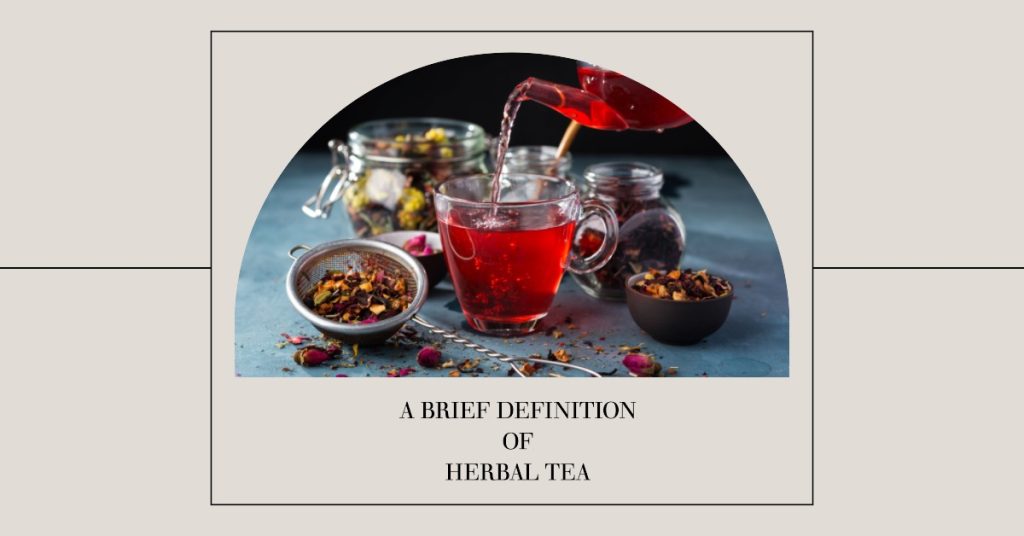
To put it simply, herbal teas are drinks made from steeping herbs or spices in hot water.
Unlike traditional teas, such as black or green, which come from the Camellia sinensis plant, herbal teas are caffeine-free and can be enjoyed any time of day without affecting sleep.
One of the biggest benefits of herbal tea is its medicinal properties.
Different herbs offer different benefits, but many have been used for centuries to help with anything from digestion issues to anxiety relief.
Chamomile, for example, has been known to help calm nerves and promote relaxation while peppermint can aid in digestion and relieve nausea.
Importance of Herbal Tea in Modern Times
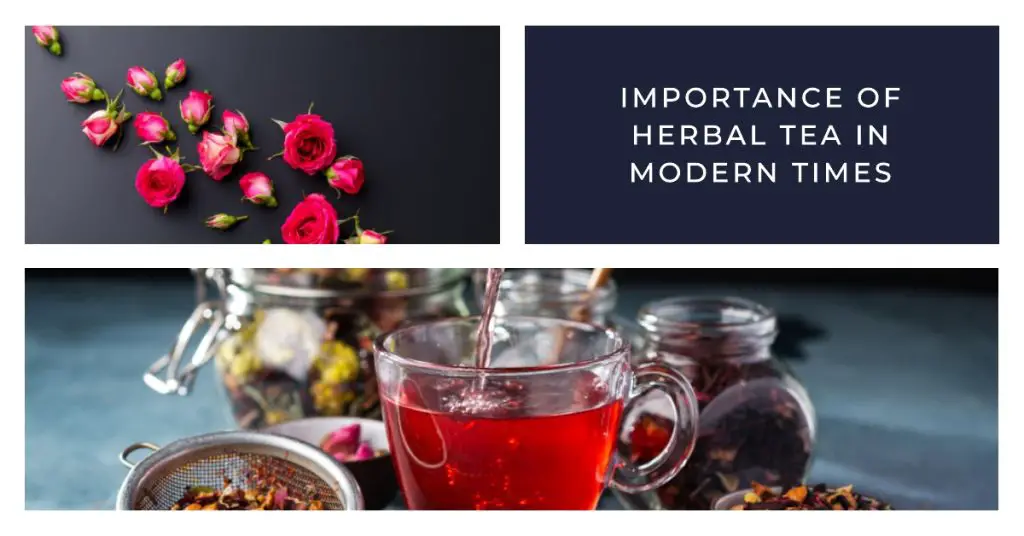
In our fast-paced modern world, more and more people are turning to herbal tea for its many benefits.
Unlike other beverages that contain caffeine or sugar, herbal tea is a natural alternative that provides a wide range of health benefits.
Herbal tea can help with digestion, boost the immune system, relieve stress and anxiety, improve sleep quality, and even reduce inflammation.
One of the biggest benefits of herbal tea is its ability to calm the mind and body.
Many people today suffer from stress and anxiety due to their busy lifestyles. Drinking a cup of herbal tea before bed can help you relax and unwind after a long day at work.
It’s also great for those who have trouble sleeping as it promotes relaxation and improved sleep quality.
Another reason why herbal tea is so important in modern times is that it contains antioxidants which can help protect against diseases like cancer.
Health Benefits of Herbal Tea
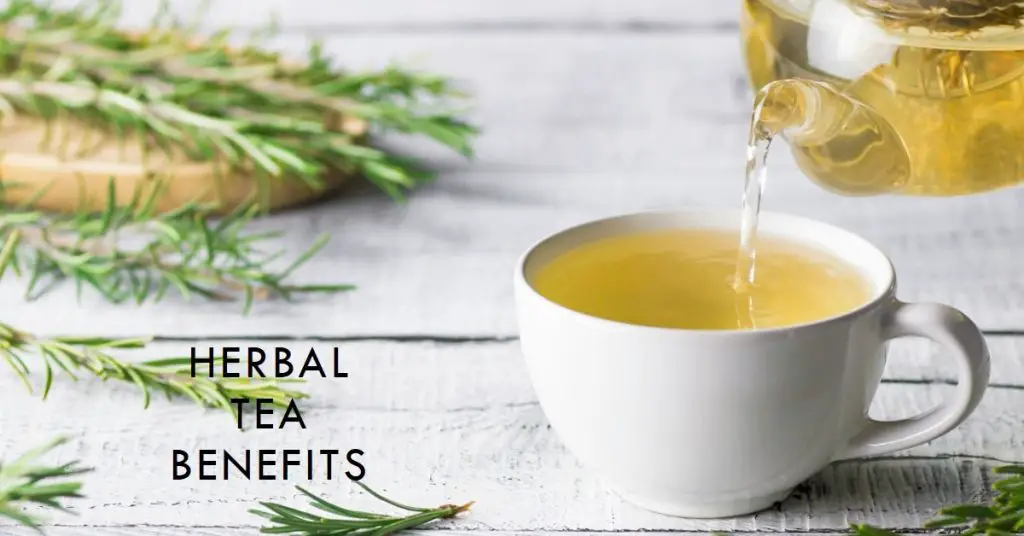
For hundreds of years, herbal tea has been used as a natural cure for a variety of diseases.
Modern research has begun to uncover data supporting both conventional and novel uses of herbal teas. Herbal tea has the following health benefits:
- Boosts immune system: Herbal teas such as ginger and echinacea can help to ensure that your existing immune system is performing at its peak
- Reduces inflammation: Some herbal teas such as chamomile and peppermint have anti-inflammatory properties that can help reduce inflammation in the body.
- Promotes cardiovascular health: Hibiscus tea offers antiviral and cardiovascular benefits, primarily due to the antioxidant “anthocyanins”.
- Aids in weight loss: Certain herbal teas, such as green tea, contain natural components known as polyphenols, which may lower the risk of a range of ailments, including obesity.
- Reduces stress and anxiety: Chamomile and lavender herbal teas have relaxing effects that can help decrease tension and anxiety.
- Enhances cognitive function: Sage tea has been shown to enhance cognitive function and memory.
- Promotes healthy skin: Spearmint tea is well-known for its healing and soothing properties, particularly when it comes to acne clearing.
- Provides antioxidant properties: Polyphenols found in herbal teas have antioxidant, antiviral, and anti-inflammatory properties; modulate detoxification enzymes; stimulate immune function and other molecular functions.
Keep in mind that not all herbal teas are made equal, and some may contain added sugars or other substances that can negate their health benefits.
It is important to select high-quality herbal teas prepared from natural components that do not contain added sweeteners or artificial flavors.
Boosts Immune System
- Herbal teas that contain antioxidants
- Herbs that help reduce inflammation
- Benefits for people with autoimmune diseases
Promotes Digestive Health
- Herbal teas that help digestion
- Benefits for people with acid reflux
- Herbs that help relieve bloating and gas
Reduces Stress and Anxiety
- Herbal teas that help reduce stress
- Herbs that promote relaxation
- Benefits for people with anxiety and depression
Promotes Heart Health
- Herbal teas that help reduce blood pressure
- Herbs that promote healthy cholesterol levels
- Benefits for people with heart disease
Types of Herbal Tea
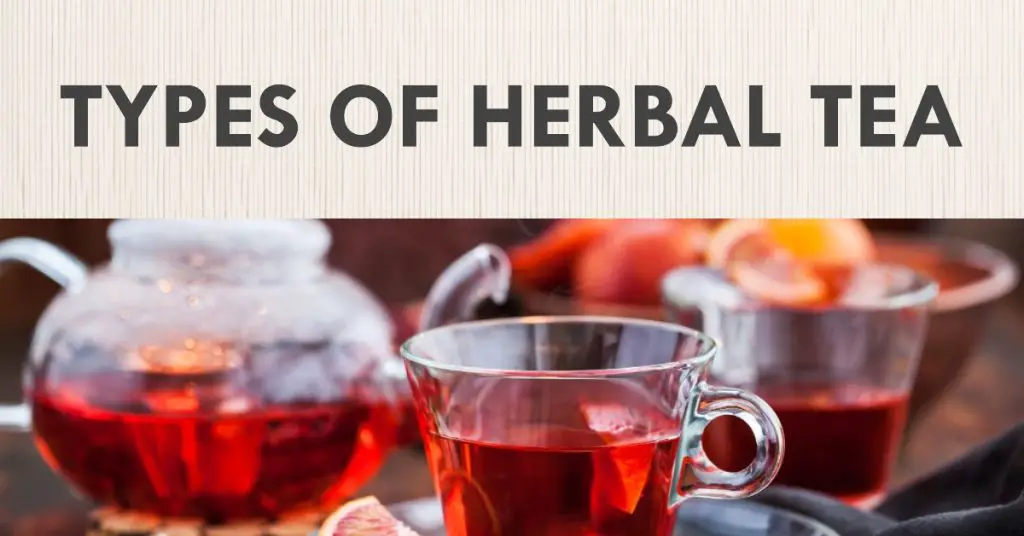
As someone who has always been a fan of tea, I have found that herbal tea is the perfect way to unwind after a long day or to start my morning off on the right foot.
Not only are there countless types of herbal teas to choose from, but each one offers unique benefits that can help improve your overall health and well-being.
Here is a list of some of the most popular herbal teas:
1. Chamomile Tea
- Chamomile tea is a popular herbal tea made from the dried flowers of the chamomile plant. It is known for its soothing and calming properties and is often consumed before bed to aid relaxation and sleep.
- Chamomile tea is also believed to have various health benefits, such as reducing inflammation and promoting digestion.
- It has a delicate, floral flavor and is commonly enjoyed with a touch of honey or lemon.
2. Peppermint Tea
- Peppermint tea is a refreshing and aromatic herbal tea made from peppermint leaves. It has a cooling and soothing effect on the body, helping to relieve stress, headaches, and digestive issues.
- With its minty flavor and natural sweetness, peppermint tea is a delicious and healthy alternative to traditionally caffeinated beverages.
- It can be enjoyed hot or cold and is a popular choice for relaxation and wellness.
3. Ginger Tea
- Ginger tea is a hot beverage made by brewing fresh or dried ginger root in hot water. It is known for its unique spicy and warming flavor and is often consumed for its soothing and healing properties.
- Ginger tea is believed to aid digestion, reduce inflammation, boost immunity, and relieve nausea and cold symptoms.
- You can be enjoyed plain or with added sweeteners such as honey or lemon.
4. Lemon Balm Tea
- Lemon balm tea is a soothing and refreshing herbal tea made from the leaves of the lemon balm plant. It has a mild citrus flavor with a hint of sweetness and is often enjoyed for its calming and relaxing properties.
- Lemon balm tea is also known for its potential health benefits, including improving digestion, reducing stress and anxiety, and supporting a healthy immune system.
- It’s also a popular choice for both casual and medicinal use.
5. Black Tea
- Black tea is a type of tea made from oxidized tea leaves, resulting in a strong and bold flavor with a dark color.
- It is the most commonly consumed tea worldwide and is known for its many health benefits, including reducing the risk of heart disease and improving mental alertness.
- Black tea is often enjoyed with milk and sugar, and it can be served hot or cold.
6. Hibiscus Tea
- Hibiscus tea is a flavorful and aromatic herbal tea made from the dried flowers of the hibiscus plant. The tea has a tart and slightly sweet taste, and is often enjoyed both hot and cold.
- Hibiscus tea is known for its health benefits, as it is rich in antioxidants and may help lower blood pressure and cholesterol levels.
- It is a popular beverage in many cultures around the world and is often consumed for its refreshing taste and potential health benefits.
7. Oolong Tea
- Oolong tea is a traditional Chinese tea that falls between black and green tea in terms of oxidation. It is partially oxidized, resulting in a unique flavor profile that is both floral and fruity with a slightly sweet aftertaste.
- Oolong tea is known for its health benefits, including aiding in digestion, reducing stress, and promoting weight loss.
- It is loved among tea connoisseurs and those who enjoy a more complex and nuanced tea experience.
8. Echinacea Tea
- Echinacea tea is a herbal tea made from the dried leaves, flowers, and roots of the Echinacea plant. It is commonly used to boost the immune system and alleviate symptoms of the common cold and flu.
- The tea has a slightly bitter and earthy taste and is often consumed with honey or lemon to improve its flavor.
- Echinacea tea is a popular natural remedy for those seeking a natural alternative to traditional medicine.
9. Rooibos Tea
- Rooibos tea is a popular herbal tea made from the leaves of the South African plant Aspalathus linearis.
- It is known for its naturally sweet and nutty flavor, as well as its numerous health benefits, including being rich in antioxidants and promoting relaxation.
- Rooibos tea is also caffeine-free, making it a great alternative to traditional tea or coffee.
Final Thoughts on Herbal Tea Benefits
In conclusion, herbal tea has been used for centuries as a natural remedy for various ailments.
It’s not just a delicious beverage, but also provides numerous health benefits such as improving digestion, reducing stress and anxiety, boosting immunity and promoting better sleep.
Whether you’re an avid tea drinker or new to the world of herbal teas, incorporating it into your daily routine can have significant positive effects on your overall well-being.
So why not brew yourself a cup of your favorite herbal tea today and experience its hidden potential firsthand? Your body will thank you!
References
- https://www.pennmedicine.org/updates/blogs/health-and-wellness/2019/december/health-benefits-of-tea. www.pennmedicine.org/updates/blogs/health-and-wellness/2019/december/health-benefits-of-tea.
- “8 Benefits of Chamomile Tea.” 8 Benefits of Chamomile Tea, www.medicalnewstoday.com/articles/320031.
- “12 Science-Backed Benefits of Peppermint Tea and Extracts.” 12 Science-Backed Benefits of Peppermint Tea and Extracts, www.healthline.com/nutrition/peppermint-tea.
- https://www.pennmedicine.org/updates/blogs/health-and-wellness/2019/december/health-benefits-of-tea. www.pennmedicine.org/updates/blogs/health-and-wellness/2019/december/health-benefits-of-tea.
- “Herbal Tea: 9 Remarkable Benefits.” Herbal Tea: 9 Remarkable Benefits &Ndash; Tea Drops, www.myteadrop.com/blogs/news/herbal-tea-benefits.
- “Herbal Tea Health Benefits and Its Side Effects | Lybrate.” Lybrate, www.lybrate.com/topic/herbal-tea-health-benefits.


Leave a Reply